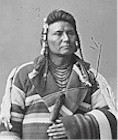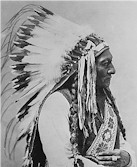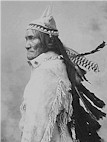|
|
Native American Genealogy
North American Indian Tribes
Ten Bears, Yamparika Comanche Chief
At the Medicine Lodge Creek Council at Kansas in October 1867: "I was born upon the prairie where the wind blew free and there was nothing to break the light of the sun. I was born where there were no enclosures and where everything drew a free breath. I want to die there and not within walls."

Techumseh (Shooting Star), Shawnee Chief "Where today is the Pequot? Where are the Narragansetts, the Mohawks, the Pokanoket, and many other once powerful tribes of our people? They have vanished before the avarice and the oppression of the white man, as snow before the summer sun."

Joseph (Thunder Rolling in the Mountains), Nez Perce Chief Upon surrender, October 1877: "I am tired of fighting. Our chiefs are killed. Looking Glass is dead. Toohulhulzote is dead. The old men are all dead. It is the young men who say yes or no. He who led the young men [Joseph's brother, Ollokot] is dead. It is cold and we have no blankets. The little children are freezing to death. My people, some of them have run away to the hills and have no blankets, no food; no one knows where they are - perhaps freezing to death. I want to have time to look for my children and see how many I can find. Maybe I shall find them among the dead. Hear me my chiefs. I am tired; my heart is sick and sad. From where the sun now stands I will fight no more forever." After the surrender, Chief Joseph and his people were sent to Indian Territory where five of his children and many of his tribe died of disease.
Wetatonmi, Nez Perce, widow of Chief Joseph's brother, Ollokot On leaving tribal lands after the surrender, October 1877: "It was lonesome, the leaving. Husband dead, friends buried or held prisoners. I felt that I was leaving all that I had but I did not cry. You know how you feel when you lose kindred and friends through sickness - death. You do not care if you die. With us it was worse. Strong men, well women and little children killed and buried. They had not done wrong to be so killed. We had only asked to be left in our own homes, the homes of our ancestors. Our going was with heavy hearts, broken spirits."
Red Cloud, Oglala Sioux

"They made us many promises, more than I can remember, but they never kept but one; they promised to take our land, and they took it."
Crazy Horse, Oglala Sioux Chief "We did not ask you white men to come here. The Great Spirit gave us this country as a home. You had yours. We did not interfere with you. The Great Spirit gave us plenty of land to live on, and buffalo, deer, antelope and other game. But you have come here; you are taking my land from me; you are killing off our game, so it is hard for us to live. Now, you tell us to work for a living, but the Great Spirit did not make us to work, but to live by hunting. You white men can work if you want to. We do not interfere with you, and again you say, why do you not become civilized? We do not want your civilization! We would live as our fathers did, and their fathers before them." Crazy Horse was forced to surrender in the spring of 1877. He was arrested in September of the same year and mortally wounded by a Sioux guard at Fort Robinson, Nebraska.
White Bear, Kiowa Chief "I do not want to settle down in the houses you would build for us. I love to roam over the wild prairie. There I am free and happy. When we sit down, we grow pale and die."
Sittin Bull (Tatanka Lyotanka), Hunkpapa Sioux Warrior and Medicine Man "If a man loses anything and goes back and looks carefully for it he will find it, and that is what the Indians are doing now when they ask you to give them the things that were promised them in the past; and I do not consider that they should be treated like beasts, and that is the reason I have grown up with the

feelings I have." ------ "I do not wish to be shut up in a corral. It is bad for young men to be fed by an agent. It makes them lazy and drunken. All agency Indians I have seen are worthless. They are neither red warriors or white farmers." Sitting Bull took about 900 of his followers to Canada. As game became scarce on the Canadian plains, hundreds of Lakotas crossed back to the US and with less than 200 of his people remaining, Sitting Bull surrendered to US authorities at Fort Buford, Dakota Territory on July 20, 1881. Held as a prisoner of war for two years, he returned to his people at Standing Rock Reservation in 1883. With the rise of the Ghost Dance Religion, there was fear he was inciting his people so Indian agents were sent to arrest him. Claiming he tried to escape, they shot and killed Sitting Bull on December 15, 1890. His people scattered and some fled the reservation. Big Foot and his band of 350 Miniconjou Lakota were rounded up by soldiers of the 7th Cavalry and on December 29, 1890, nearly 200 were killed in what became known as the Massacre at Wounded Knee.
Black Elk, Lakota Sioux Holy Man On the Massacre at Wounded Knee: "Something else died there in the bloody mud, and was buried in the blizzard. A people's dream died there." Black Elk's Lament; "You see me now a pitiful old man who has done nothing, for the nation's hoop is broken and scattered. There is no center any longer, and the sacred tree is dead."
Standing Bear, Ponca Chief On the forced removal from their lands in Nebraska: "We told them we would rather die than leave our lands; but we could not help ourselves. They took us down. Many died on the road. Two of my children died. After we reached the new land, all my horses died. The water was very bad. All our cattle died; not one was left. I stayed until one hundred and fifty-eight of my people had died. Then I ran away with thirty of my people, men and women and children. Some of the children were orphans. We were three months on the road. We were sick and weak and starved. When we reached the Omaha Reserve the Omahas gave us a piece of land, and we were in a hurry to plough it and put in wheat. While we were working, the soldiers came and arrested us. Half of us were sick. We would rather have died than be carried back; but we could not help ourselves."
Black Hawk, Sauk and Fox Chief In a dedication from his autobiography to General H. Atkinson who was commander of the army in the battle leading to his surrender, 1833: "I am now an obscure member of a nation, that formerly honored and respected my opinions. The path to glory is rough and many gloomy hours obscure it. May the Great Spirit shed light on yours - and that you may never experience the humility that the power of the American government has reduced me to, is the wish of him, who, in his native forests, was once as proud and bold as yourself."
Seattle (Sealth), Suquamish and Duwamish Chief Replying to a speech by Governor Isaac Stevens on the signing of the treaty surrendering their lands, 1855: "Our dead never forget the beautiful world that gave them being. They still love its verdant valleys, its murmuring rivers, its magnificent mountains, sequestered vales and verdant lined lakes and bay, and ever yearn in tender, fond affection over the lonely hearted living, and often return from the Happy Hunting Ground to visit, guide, console and comfort them ... And when the last Red Man shall have perished, and the memory of my tribe shall have become a myth among the White Men, these shores will swarm with the invisible dead of my tribe..."
Geronimo (Goyathlay), Chiricahua Apache Leader

From his autobiography: "We are vanishing from the earth, yet I cannot think we are useless or Usen [God] would not have created us ... For each tribe of men Usen created, He also made a home. In the land created for any particular tribe He placed whatever would be best for the welfare of that tribe ... Thus it was in the beginning: the Apaches and their homes each created for the other by Usen himself. When they are taken from these homes they sicken and die. How long will it be until it is said there are no Apaches?" Upon his surrender in 1877, Geronimo and his people were taken as prisoners of war and sent to a reservation at Fort Sill, Oklahoma. Upon final surrender, they were sent into exile in Florida.
Red Jacket (Sagoyewatha), Seneca Chief In answer to why he did not want a Christian missionary to stay among his people: "We are told that your religion was given to you by your forefathers, and has been handed down from father to son. We also have a religion which was given to our forefathers, and has been handed down to us, their children. We worship in that way. It teaches us to be thankful for all favors we receive; to love each other and be united. We never quarrel about religion, because it is a matter which concerns each man and the Great Spirit. Brother, we do not wish to destroy your religion or take it from you; we only want to enjoy our own."
Luther Standing Bear, Oglala Sioux Chief "The old Lakota was wise. He knew that man's heart away from nature becomes hard; he knew that lack of respect for growing, living things soon led to lack of respect for humans too. So he kept his youth close to its softening influence."
Wild Cat (Coacoochee), Seminole Chief Upon surrender, 1858: "When I was a boy, I saw the white man afar off, and was told that he was my enemy. I could not shoot him as I would a wolf or a bear, yet he came upon me. My horse and fields he took from me. He said he was my friend. He gave me his hand in friendship; I took it, he had a snake in the other; his tongue was forked; he lied and stung me. I asked for but a small piece of this land, enough to plant and live on far to the south - a spot where I could place the ashes of my kindred - a place where my wife and child could live. This was not granted me." Hollow Horn Bear, Oglala Sioux Chief On allotment, believing they would each get a piece of land with no opening to or from: "You white men have come to us again to offer something to us which we do not fully understand. You talk to us very sweet, but you do not mean it. You have not fulfilled any of the old treaties. Why do you now bring another one to us? Why don't you pay us the money you owe us first, and then bring us another treaty?" Little Crow (Taoyateduta), Dakota Sioux Chief In response to being called a coward by Red Middle Voice before the Dakota Uprising in August/September 1862: "Taoyateduta is not a coward and he is not a fool ... We are only little herds of buffalo left scattered; the great herds that once covered the plains are no more. See - the white men are like locusts when they fly so thick that the whole sky is a snowstorm. You may kill one-two-10; yes as many as the leaves in the forest yonder, and their brothers will not miss them. Kill one-two-10, and 10 times that many will come to kill you ... Braves, you are little children - you are fools. You will die like the rabbits when the hungry wolves hunt them in the Hard Moon. Taoyateduta is not a coward. He will die with you." After the uprising, 392 Dakota men were tried and 307 sentenced to hang in retribution for the whites who had been killed. Eventually, 38 were hanged. Of those not hanged, nearly half died of disease while in prison. Little Crow and his band fled west. He then returned to Minnesota with a small raiding party. On July 3, 1863, while picking berries with his son, he was shot and killed by farmer Nathan Lamson and his son Chauncey who received a $75 scalp bounty and a bonus of $500 for ridding Minnesota of Little Crow.
Would you like to make a child's life better?
Please send a donation to:
St. Labre Indian School
Ashland MT 59004
or
Red Cloud Indian School
Pine Ridge SD 57770
|
|
|
|
|
 Native American Nations
Native American Nations
